We may not have the course you’re looking for. If you enquire or give us a call on 800969236 and speak to our training experts, we may still be able to help with your training requirements.
We ensure quality, budget-alignment, and timely delivery by our expert instructors.

Imagine you're working on a crucial Web Development project where every second counts. Given this scenario, you might need a tool that not only speeds up your coding but also minimises errors. This is where an HTML Editor becomes indispensable.
From syntax highlighting to autocompletion, these tools are designed to enhance your productivity and precision. In this blog, we'll explore the best HTML Editors available. Let's dive in and help you choose the one that will maximise your coding efficiency!
Table of Contents
1) What is an HTML Editor?
2) Code Editors for HTML
3) Best HTML Editors
4) Reasons to use an HTML Editor
5) Conclusion
What is an HTML Editor?
An HTML Editor is a tool or software that lets you create, edit, and manage HTML code. These editors offer various features to streamline the process of writing HTML. You can write HTML code in any text editor as well as save the file with a ".html" or ".htm" extension to view its functionality.
They mostly help developers maintain clean, error-free code and enhance productivity by providing tools that simplify complex tasks. Whether you're a beginner or an experienced developer, using a Hypertext Markup Language (HTML) Editor can significantly improve your coding workflow.
Code Editors for HTML
When it comes to writing and editing HTML, choosing the appropriate code editor can make a significant difference. Below, we explore two main types of HTML Editors and their unique features:
1) WYSIWYG Editor
WYSIWYG, an abbreviation for "What You See Is What You Get". True to its name, it offers a real-time feature to display the code output. It also gives a visual interface similar to a typical word processor. With this editor, users can add elements to a webpage, such as headings, paragraphs, or images, without needing to write any code.
2) HTML Text Editor
This editor is specifically designed for developing text-based editors, encouraging developers to practice coding. It allows direct modification of code during work and offers features such as auto-completion, syntax highlighting, and error detection. However, it does not provide a real-time feature to display the code output.
Start building stunning and responsive websites - join our HTML and CSS Course now!
Best HTML Editors
Choosing the right HTML Editor can greatly enhance your web development experience. Below are some of the best available editors, each providing unique features to suit different needs.
1) Notepad ++
This free and open-source software is used for writing HTML code and is exclusively available for Windows-based operating systems. It is very lightweight and also offers a mobile version, allowing developers to continue coding without downloading it to their computer. The software is provided at no cost to developers.
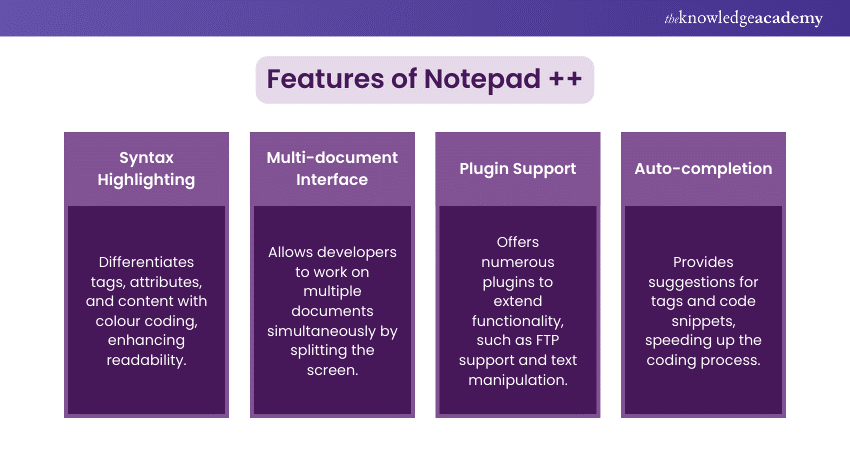
The repository for Notepad++ is also available on GitHub. Although this software is designed for Windows users, Linux users can run it using Wine by adding a compatibility layer. It also offers a flexible user interface for developers.
2) Visual Studio Code
This open-source software, developed by Microsoft, is used for writing HTML code. With this framework, projects can be created utilising HTML, CSS, and JavaScript across numerous operating systems, including Windows, Mac, and Linux. It is also integrated with Microsoft Azure, allowing users to develop and publish projects and applications to Azure with a single click.
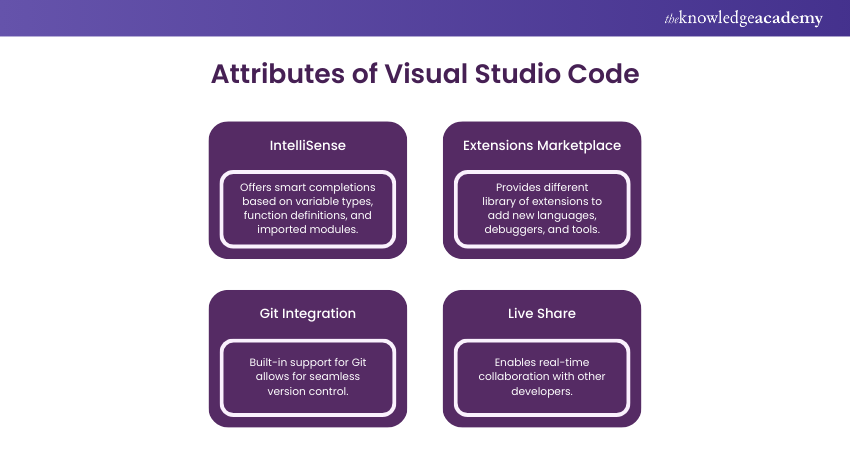
This software includes intelligent features such as auto-completion for variables, fields, and function definitions. Developers can install language extensions like Ruby and Python, enabling smart functionality for other programming languages. It gives a clean and straightforward interface, making it easy to locate multiple HTML editing tools, open new files, and search documents.
3) Sublime Text
This HTML code editor is similar to Notepad++ and offers cross-platform support, being available for Windows, Mac, and Linux systems. Users can access the basic features of Sublime Text for free, but a premium subscription is required for more advanced functionalities. Sublime Text is equipped with numerous tools that enable developers to efficiently build webpages.
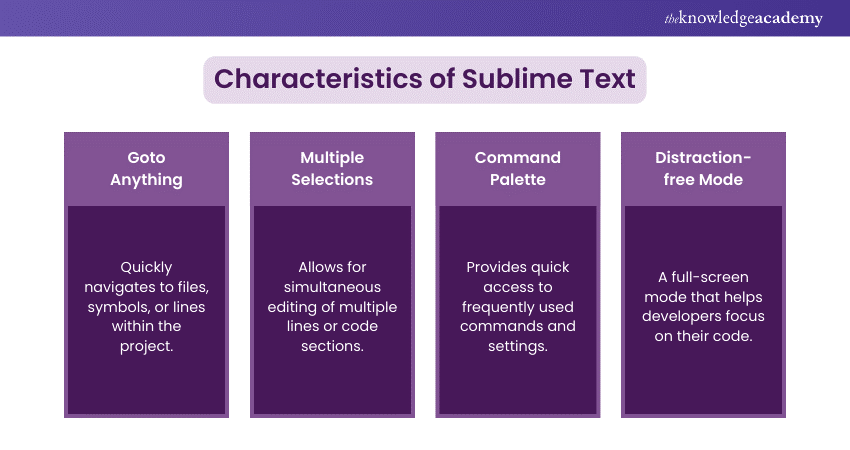
For example, Sublime Text includes a Graphics Processing Unit (GPU) rendering system that optimises the performance of the operating system. The latest version supports various programming languages, including TypeScript, JavaScript XML (JSX), and TSX (syntax extension for TypeScript). When developers first open Sublime Text, they will find a basic text editor without a sidebar or tools. Additionally, there is a paid version of Sublime Text available.
4) Atom
This is the most popular HTML Editor on the market. It is an open-source code editor designed to offer premium features to developers entirely free of charge. Maintained by the GitHub community, this editor allows developers to add, modify, and share various source codes to enhance its functionality.
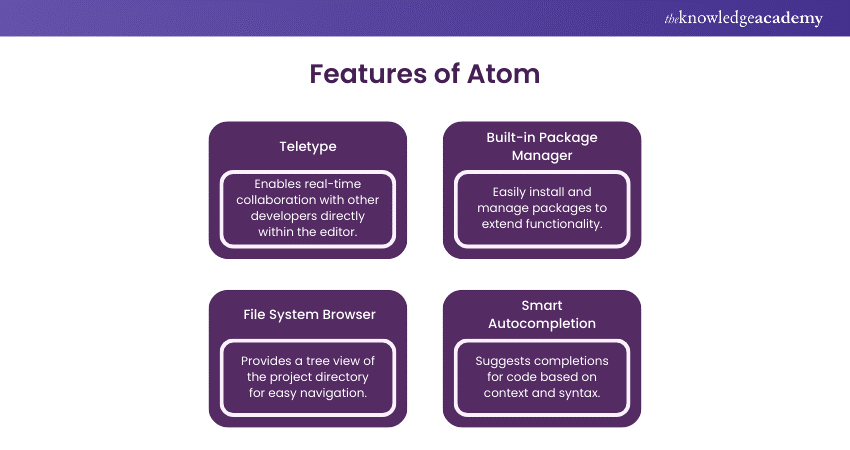
Developers can also personalise the editor's interface by changing themes. Atom is not a visual editor, so real-time output of HTML code cannot be viewed. It supports multiple programming languages, including JavaScript, Node.js, and Cascading Style Sheets (CSS). Additionally, it integrates with Teletype, enabling collaboration on projects with other developers.
Gain the skills to craft compelling and responsive websites - sign up for our Website Design Course.
5) Brackets
Brackets is an open-source software primarily used for Web Development, offering live editing capabilities for HTML, CSS, and JavaScript. Like the Notepad editor, you can create a new file and then save it with a ".html" or ".htm" extension to run the HTML file.
In addition to its live editing features, Brackets includes a built-in preview function that allows developers to see changes in real-time within the browser. It also supports preprocessor usage, making it easier to work with Leaner Style Sheets (LESS) and Sassy Cascading Style Sheets (SCSS) files.
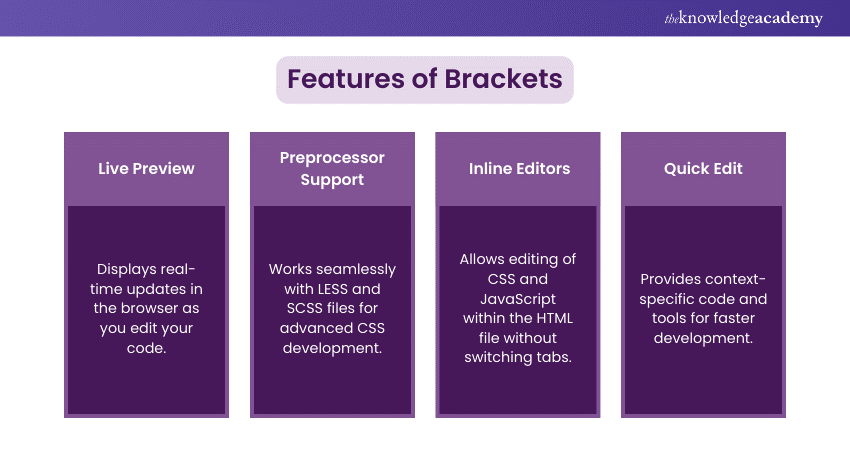
Furthermore, Brackets has an extensive library of extensions, enabling developers to customise their workflow and enhance productivity. Its user-friendly interface and robust functionality make it a popular choice among web developers.
6) Adobe Dreamweaver CC
Adobe Dreamweaver CC is an Integrated Development Environment (IDE) that supports both back-end and front-end development. It offers web design and development toolkits to simplify website creation. The powerful code editor supports HTML, CSS, and JavaScript, and provides tools to work with SCSS, offering a more advanced approach compared to CSS. To understand the key differences between SCSS and CSS, it’s important to explore how Dreamweaver handles both for more efficient web development.
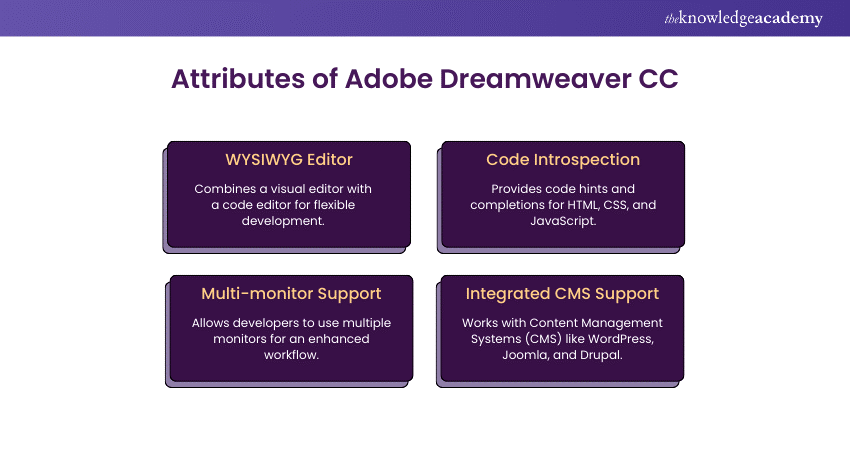
The text editor includes features like syntax highlighting, code completion, and multi-language support, while the visual editor offers drag-and-drop functionality. Although there is no free version, a seven-day trial is available. Payment plans start from approximately £16.17 per month, with licences available on a monthly, annual, or prepaid basis. Dreamweaver CC's comprehensive toolset and flexibility make it a popular choice for both novice and experienced Web Developers.
7) Froala
Froala is a front-end WYSIWYG HTML Editor known for its optimised performance, with a GZIP core of just 50 KB, allowing it to load in as little as 40 milliseconds. It is optimised for mobile and compatible with both Android and iOS devices.
Despite its WYSIWYG interface, Froala offers rich text editor capabilities, allowing users to add elements like videos, table cells, and emoticons. Additionally, it integrates with Codox.io for real-time editing and collaboration.
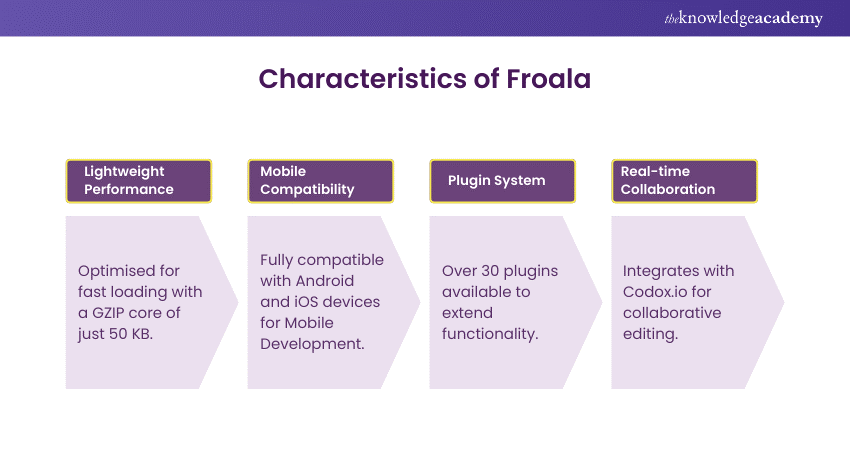
Froala offers two subscription plans, ranging from approximately £495 to £1,078 per year. Users can test the software before purchasing a licence, and it is available for free download from the Node Package Manager (NPM).
8) CoffeeCup
CoffeeCup is an HTML Editor with a wide range of features. Users can create HTML and CSS files from scratch or customise pre-made templates. It offers a components library for adding elements like menus, footers, and headers across multiple pages, allowing easy updates.
The editor provides multiple preview options, including a live preview that splits the screen between the coding area and the web page, and an external preview in a new window.
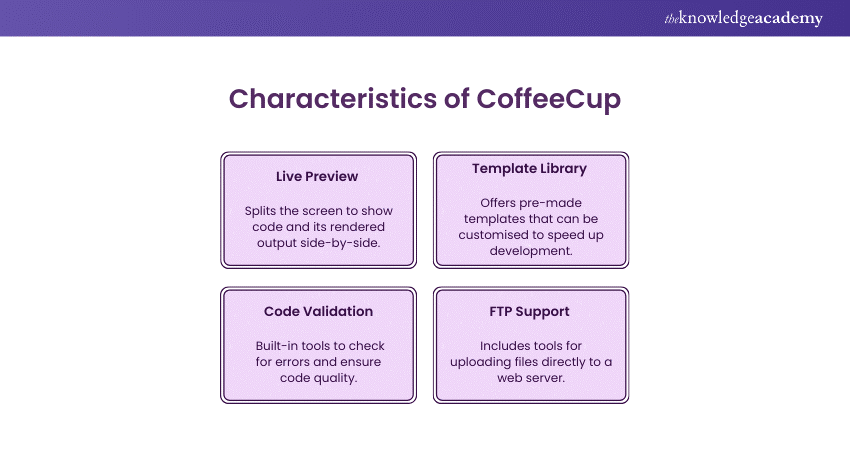
A free trial version with full functionality is available for 30 days. After that, users can purchase a licence for approximately £22 to continue using the software.
Reasons to use an HTML Editor
Using an HTML Editor can significantly enhance your web development experience. Here are some key reasons to use it:
1) Syntax Highlighting
HTML Editors use colour coding to differentiate tags, attributes, and content, enhancing code readability. This feature helps developers quickly spot errors and understand the structure of their code.
2) Autocompletion
These editors suggest tags and correct common errors, speeding up the coding process. It also reduces the likelihood of typos and ensures consistency in your code.
3) Code Validation
Built-in validators check for syntax issues and missing tags. This ensures that your code adheres to web standards and functions correctly across different browsers.
4) Debugging Tools
Some editors include debugging features to help identify and fix errors. These tools can provide detailed error messages and highlight problematic code sections.
5) Customisation Options
You can customise the interface and settings to improve your coding experience. This allows you to tailor the editor to your workflow and preferences, enhancing productivity.
Conclusion
In conclusion, choosing the right HTML Editor can transform your coding journey, making it smoother and more productive. With numerous features like syntax highlighting and debugging tools, these editors are essential for any Web Developer aiming for efficiency and precision. Explore their capabilities and take your coding skills to the next level!
Dive into the world of coding with our expert-led App & Web Development Training.
Frequently Asked Questions
Who Created HTML?

HTML, or Hypertext Markup Language, was created by Tim Berners-Lee in 1991 while he was working for the CERN, the European Organisation for Nuclear Research.
Who Owns HTML language?

Although Tim Berners-Lee developed it, HTML is not owned by any one individual or company. Instead, it is maintained by the World Wide Web Consortium (W3C), an international community that oversees the web standards to ensure the language remains open and universal.
What are the Other Resources and Offers Provided by The Knowledge Academy?

The Knowledge Academy takes global learning to new heights, offering over 30,000 online courses across 490+ locations in 220 countries. This expansive reach ensures accessibility and convenience for learners worldwide.
Alongside our diverse Online Course Catalogue, encompassing 19 major categories, we go the extra mile by providing a plethora of free educational Online Resources like News updates, Blogs, videos, webinars, and interview questions. Tailoring learning experiences further, professionals can maximise value with customisable Course Bundles of TKA.
What is The Knowledge Pass, and How Does it Work?

The Knowledge Academy’s Knowledge Pass, a prepaid voucher, adds another layer of flexibility, allowing course bookings over a 12-month period. Join us on a journey where education knows no bounds.
What are the Related Courses and Blogs Provided by The Knowledge Academy?

The Knowledge Academy offers various App & Web Development Trainings, including HTML, UI/UX and Mobile App Development Courses. These courses cater to different skill levels, providing comprehensive insights into GIT Branching Strategy for Efficient Development
Our Programming & DevOps Blogs cover a range of topics related to HTML, offering valuable resources, best practices, and industry insights. Whether you are a beginner or looking to advance your Web Development skills, The Knowledge Academy's diverse courses and informative blogs have you covered.
Upcoming Programming & DevOps Resources Batches & Dates
Date
 Introduction to HTML
Introduction to HTML
Fri 28th Mar 2025
Fri 23rd May 2025
Fri 25th Jul 2025
Fri 26th Sep 2025
Fri 28th Nov 2025






 Top Rated Course
Top Rated Course



 If you wish to make any changes to your course, please
If you wish to make any changes to your course, please


